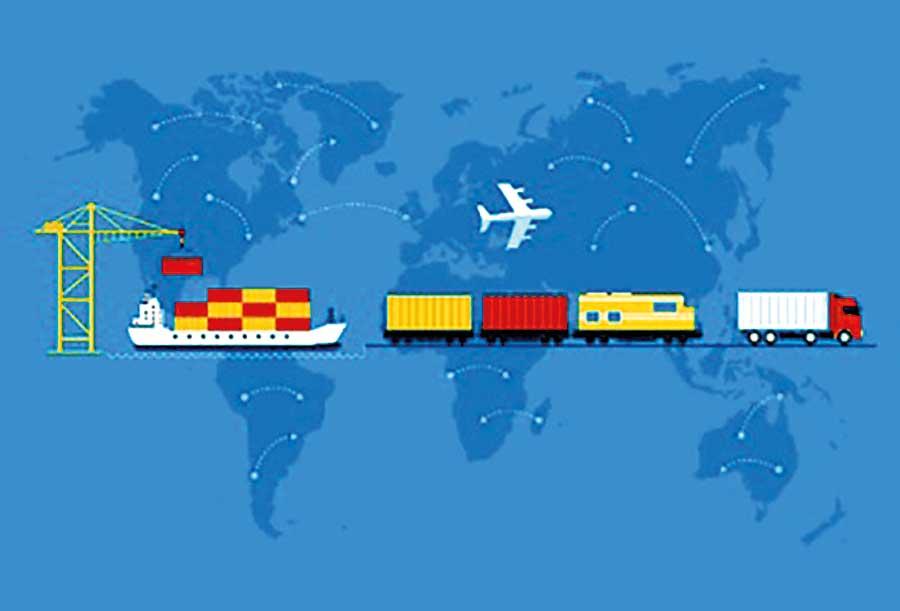06 May 2024 - {{hitsCtrl.values.hits}}

World trade can be complicated if not understood properly. Trade is rules-based transactions. Incoterms (International Commercial Terms) are one such common language of international trade published by the International Chamber of Commerce (ICC), based in Paris, France.
(International Commercial Terms) are one such common language of international trade published by the International Chamber of Commerce (ICC), based in Paris, France.
Many buyers, sellers, traders, service providers and bankers don’t understand their importance and the potential consequences of misuse of the terms in sales contracts, which can bring serious consequences to businesses. Understanding the rules and responsibilities when importing or exporting goods is an essential tool for international trade specialists.
The concept of Incoterms starts with cost, risks and liabilities from origin to destination when goods are moved by different modes of transportation. It is essential, so that the traders know which of the 11 Incoterms (2020) rules are best for each type of cargo on a specific transport mode and to select the best term to contract with the buyers or sellers. A common mistake starts with the selection of the wrong term. Some examples are sighted below.
Use of wrong terms
A common mistake is to use a traditional “sea and inland waterway only” rule such as FOB Incoterms (Free on Board) or CIF Incoterms (Cost, Insurance and Freight) for containerised goods, instead of a rule for “all transport modes”. This exposes the exporter/importer to unnecessary risks. For example, under FOB, the risk is officially transferred when the cargo is loaded on board the vessel. However, it’s common practice in modern shipping and ports that the shippers hand over the cargo to the carrier at the terminal or CFS, where it awaits to be loaded onto a vessel.
It has been recommended that FCA (Free Carrier), CPT (Carriage Paid To) and CIP (Carriage and Insurance Paid To), be used instead of CFR, CIF or FOB, as these are the correct alternatives and are meant for containerised freight. For each of these, risk is transferred at the origin when the cargo is handed over to the carrier at the agreed upon location at the origin.
When choosing between CFR/CIF versus FOB for shipping, CFR/CIF (Cost and Freight and Cost, Insurance and Freight) should be used when you have direct access to the vessel for loading, including non-containerised goods. By contrast, FOB (Free on Board) refers to when the risk transfers from the seller to the buyer, once the cargo is loaded on board the vessel.
Without knowing import regulations, another common mistake is also to accept DDP (Delivery Duty Paid) without thinking about whether the seller can undertake all the necessary formalities in the buyer’s country, e.g. paying GST or VAT. The opposite of it is the importers using EXW (Ex Works) without knowing the detailed regulations and processes of the origin country.
Misunderstanding insurance
Under CIF (Cost, Insurance and Freight) and CIP (Carriage and Insurance Paid To), the seller must provide insurance coverage. When using the CIF and CIP Incoterms rules, the seller arranges insurance in the buyer’s name and it must cover a minimum of 110 percent of the total shipment value. Confusion often happens with these Incoterms and the cargo may end up without insurance or not adequate insurance. CIP gives higher coverage than CIF. Therefore, it is recommended to check whether the insurance coverage is sufficient and matches the requirements of the commercial contract with an insurance company.
Delivery and pick-up points
Many in the trade are not aware that Incoterms rules allow locations to be specified to avoid misunderstandings. Failure to specify a full address for delivery or pick-up may cause a dispute as it allows the seller or buyer to choose any delivery or receiving point within the general location provided. This may lead to cost escalation and claims, etc.
Incoterms rely on an exact place, terminal, port, etc. and at these stages, the risk and responsibility change hands. Therefore, it’s crucial to be specific when naming these places or addresses, so if something happens, both parties know exactly whose hands the cargo was in and where the responsibility lies.
Confusing ownership and risk
The Incoterms rules do not regulate the passing of title (ownership) from the seller to the buyer. They only cover the cost, risk and liability during the period of pick-up and delivery and divide the costs accordingly. Most traders confuse the ownership and rely on Incoterms instead of transport documents such as the Bill of Lading (BL) and other banking regulations to define ownership.
The advice is for traders to learn how to use these terms by studying the Incoterms book that is revised every 10 years by the ICC Paris drafting committee and incorporate the best rules in the sales contract.
(The writer, an economist by profession, with well over 32 years of experience in the shipping, international trade and logistics industry, is the founder of Shippers Academy International, a member of the ICC Incoterms drafting committee (2010-2015), a former Chairman of the Sri Lanka Shippers’ Council and First Secretary General of the Asian Shipper’s Council)
28 Nov 2024 2 hours ago
28 Nov 2024 3 hours ago
28 Nov 2024 4 hours ago
28 Nov 2024 5 hours ago
28 Nov 2024 6 hours ago